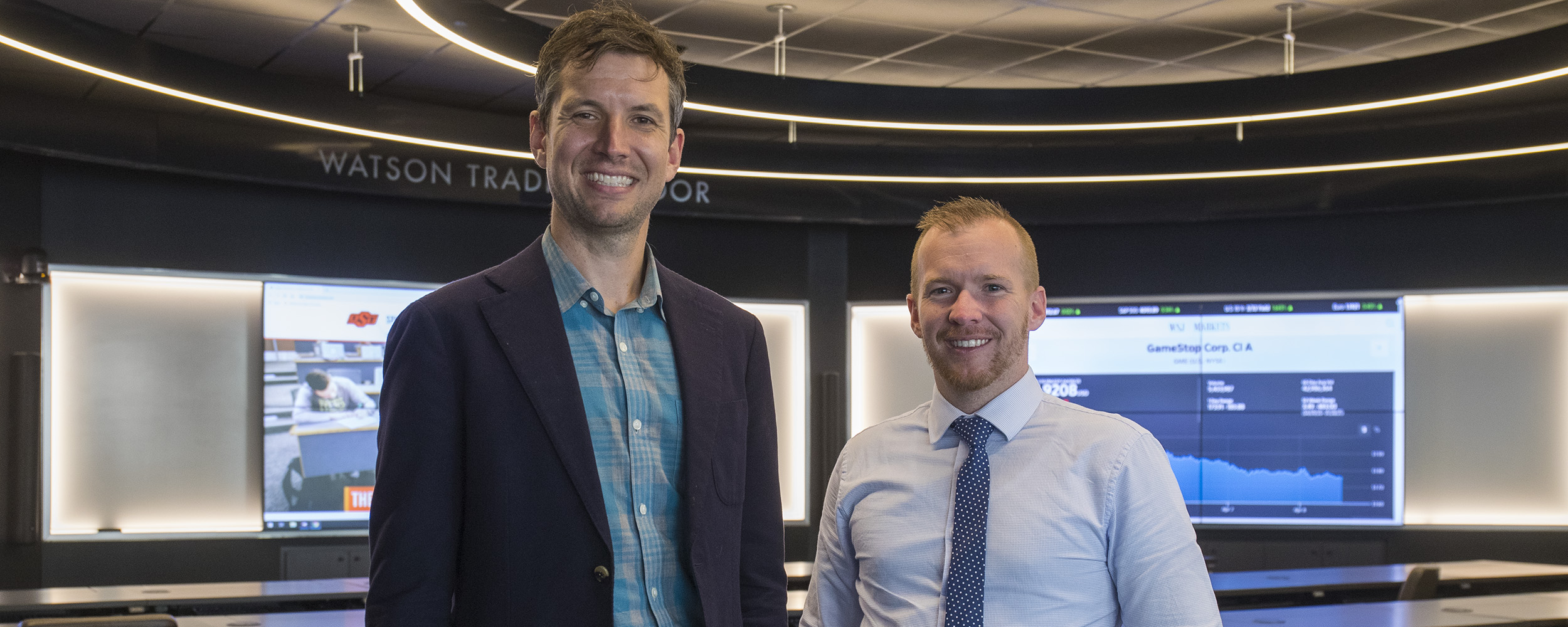
OSU-led research shows what you don’t know about the market could hurt other investors
Tuesday, June 15, 2021
Media Contact: Terry Tush | Director, Marketing and Communications | 405-744-2703 | terry.tush@okstate.edu
Trading stocks has always been a rough and tumble world of uncertainty, even for well-informed investors.
But with the growing availability of noncommission stock trades and easy-to-use mobile trading apps, investing is within reach of anyone with a little extra cash, but is everyone investing a good thing? A pair of Oklahoma State University professors and their colleagues argue that may not be the case.
Research led by Spears School of Business finance faculty members Drs. Greg Eaton and Brian Roseman suggests that with more individuals buying and selling stocks, equity markets are experiencing increased volatility and liquidity issues. This result was demonstrated by the hysteria surrounding stock trades of video game retailer GameStop in January 2021, which saw the price of its stock skyrocket more than 1,500 percent in a two-week frenzy of trading. A growing segment of investors influenced less by fundamentals than by market “noise” may be destabilizing and increasing volatility in the markets, according to their research.
“If you have a bunch of noise investors, or uninformed investors, who all buy the same stock at the same time, that can overwhelm the market makers, who are the folks in the financial markets who help ensure the markets function properly,” Eaton said. “That can lead to deterioration in measures of market quality like volatility and liquidity.”
Eaton and Roseman, both assistant professors of finance, collaborated with Emory University’s Dr. T. Clifton Green and Ph.D. candidate Yanbin Wu to author open-access prepress research available for review on SSRN.com analyzing the influence of investors using the online trading platform Robinhood. The company’s commission-free trades and easy-to-use mobile app have driven double-digit growth. The brokerage, which started in 2013, grew 30 percent in the first quarter of 2020 and has been reported to have more than 13 million users.
That rapid growth and accompanying growing pains in the form of trading outages, including two on March 2, 2020, when the Dow Jones Industrial Average experienced the largest daily points gain in its history. Robinhood blamed market volatility, record trading volume and record sign-ups for the malfunction. For Roseman, Eaton and their colleagues, outages offered a way to document Robinhood’s impact on markets.
“When Robinhood investors go away, measures of market quality improve,” Eaton said.
The researchers found that Robinhood traders experienced outages on 25 trading days during the study’s eight-month sample period from January to August 2020. They collected data on measures of market quality, like liquidity and volatility, during periods when Robinhood investors were sidelined. The data suggests market quality improved when Robinhood was offline.
“Trading outages are a perfect mechanism for seeing how the market reacts without the traders present,” Roseman said. “With the number of outage events in our study, we hope we can show a direct relationship between Robinhood and the health of the markets.”
But why do Robinhood investors have such an outsized impact? The research theorizes that traders using the platform are younger and less informed about the stocks they’re buying and selling. In studies cited by the scholars, Robinhood investors often trade on hype, rumor and stale news fed by social media discussions like that found on the Reddit investing forum r/WallStreetBets. Overheated trading of stocks preferred by Robinhood traders, like GameStop earlier this year, now has a name given to it by industry watchers — the “Robinhood effect.”
“That wasn’t what we initially expected,” Roseman said. “There are a handful of theories and studies supporting the idea that uninformed retail traders make markets better, since they help balance order flow. But the GameStop episode earlier this year is an extreme case that highlights when markets can be better without noise traders. A large crowd trading in one direction, whether it be substantial buying or selling, strains the market.”
Why do the study’s authors believe Robinhood users tend to be uninformed? The researchers cite data showing the average Robinhood trader is 31 years old, compared with the average U.S. retail investor who is 50, and they cite studies suggesting young investors are less financially literate. They also offer evidence from Robinhood’s frequently asked questions webpage, where the most common topic lookup by Robinhood users is, “What is the stock market?”
Eaton, Roseman and their Emory colleagues are looking more deeply at why Robinhood investors impact markets and also the link between noncommissioned traders and high-frequency traders. Their research shows that HFTs reduce trading activity significantly during Robinhood outages, but why and what is the impact on the health of markets?
“When we look specifically at the quotes by wholesale HFT firms that trade directly with Robinhood clients, there is a very clear shift in risk surrounding the outage events,” Roseman said. “Before the outage, when Robinhood traders are present, these firms are exposed to large inventory risks that come from correlated trading, especially in stocks heavily talked about on r/WallStreetBets. During the outage, when the Robinhood traders are removed, we see risk and volatility drop, liquidity improve and quotes stabilize. Once the traders come back, the risk returns.”
To read the working research paper, “Zero-Commission Individual Investors, High Frequency Traders, and Stock Market Quality,” visit http://okla.st/trading.
Story By: Jeff Joiner | Engage@Spears Magazine
